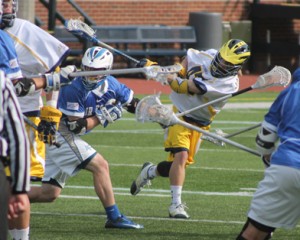In anticipation of tonight’s big in-state battle, let’s take a look at the unit matchups piece-by-piece. Up next: the Michigan offense against Detroit’s defense.
Michigan offense
After changing coordinators going into last season, the Michigan offense actually ended up getting worse (even if they looked better doing it). That’s partially attributable to a dropoff in experience and a host of injuries, but this year’s team should be able to make a bounceback.
The attack is led by a trio of players – with a fourth possibly entering the lineup and bumping somebody else out. Juniors Andrew Portnoy and David McCormack have started both games alongside freshman Ian King thus far, but that leaves Michigan without a true lefty on attack. Junior Will Meter has been slowly working back to the field, and could fill that role, most likely bumping out McCormack (in what is suddenly a very deep attack unit). Portnoy is the X player and distributor, whose unconventional style gets him opening. The other three are varying degrees of dodger/finisher, with McCormack most toward the former and King (thus far in his career, at least) the latter.
In midfield, Michigan has augmented last year’s dangerous young duo of Mike Hernandez and Kyle Jackson – now sophomores – with a healthy version of fifth-year senior Thomas Paras. There seems to be just as much depth here as at attack with talented freshman Mikie Schlosser and a few others joining the output. Jackson is a Canadian (in nationality and style) dodger/shooter who is willing to launch from pretty much anywhere, while Paras dodges relatively well – he also plays attack when needed there – and Hernandez is more a ball-carrying shooter than a true dodger.
U-M’s offense has been balanced so far between attack and midfield.
Detroit defense
The Titans lost several key pieces of last year’s defense, with goalie AJ Levell (now an undergraduate assistant with the team), LSM Jordan Houtby (now a pro lacrosse player), and D-pole Jamie Hebden all out the door. Along with 15-game starter John Dwyer, the lost production represents a significant portion of Detroit’s defensive talent and experience. Because of that, they’re expected to take a step back from their heavy-pressure defense, playing a more traditional scheme (they won’t pack it in, but they’re closer to that than ever). They caused a number of turnovers against Mercer, but were relatively clean in the penalty department, indicating that change to at least a certain degree.
Chris Shevins, Joe Gifford, and Jordan Yono started against Mercer, and while they have a decent amount of experience already (Shevins started three games last year and played in all 15, Gifford and Yono played in 13 apiece), they aren’t going to call to mind the Hebden days. They’ll be a little more conservative, and while that probably means they’ll get beaten to the rack less, talented attackmen should still be able to find openings without as much threat of turning it over.
The defensive midfield is strong, despite the loss of Houtby. The star is SSDM Nick Garippa, who ended up missing much of last season with a knee injury. Along with fellow senior Troy Dennis, they still have the ability to cause a bit of havoc by extending the midfield and putting on some pressure (without leaving the poles to make dangerous slides and open the inside). Thomas Sible provides a really good third option. The LSM could be a weak point, with either a converted short-stick or close D playing plenty of minutes.
In goal, Connor Flynn looks like a very solid keeper, and probably not a significant step down from Levell (though it’s unfair to ask a redshirt freshman to perform like Levell did last season). Juniors Damie Danseglio and Chris Kelly have a bit of experience, and could factor in as well.
Things to watch
I’m going to go out on a limb here and say Detroit’s defensive midfield should be able to win the battle against Michigan’s offensive midfield. That’s not to say they’ll completely shut them down, but limiting the production and forcing them to rely on the attack to make the majority of Michigan’s offense hum. While U-M’s attack is still capable of getting it done, the young talent in midfield is more dangerous overall.
On that front, who gets the pole on Michigan’s midfield? That’s traditionally the short straw for the offensive player (for obvious reasons – a pole is harder to beat), but this year’s Detroit team has so much talent at SSDM and enough question marks at LSM that it could be the most interesting on-on-one matchup in the whole game.
I do think Michigan’s attack – especially if Meter is back – should be relatively successful against a young Detroit defense. While the Titans are physically imposing, their rough-and-tumble reputation probably won’t hold this fall with the lack of experience. There will be openings, and Michigan’s players will have to execute.
As for Flynn, one game of evidence is not enough to determine just how good he’s going to be. He wasn’t nearly as solid against a poor Mercer offense as Michigan’s Robbie Zonino was, but sample size, etc. etc.

